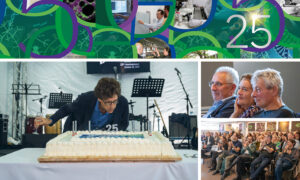Applications for the EMBL International PhD Programme are open till 14 October 2024. The programme offers fully funded PhD positions in life sciences at EMBL’s six sites across Europe. Detailed information about the programme is available here.
Training for the future
How EMBL’s PhD programme is shaping tomorrow’s scientific leaders

By Monika Lachner, Anne Ephrussi, Matthias Hentze
Since its establishment in 1974, one of EMBL’s key missions has been providing in-depth, relevant training to the scientific community in Europe and beyond. EMBL’s 1982 programme laid down the foundational plans for a PhD programme, into which the first fellows were recruited in 1983. In 1997, EMBL’s council made the historic decision to allow EMBL to grant PhD degrees; this authorisation became the basis for joint PhD degrees with numerous universities across Europe, fundamentally changing the way EMBL interacted with universities in its member states.
Almost from the beginning, EMBL stood apart in the way it structured its PhD programme, with the goal of fostering early scientific independence combined with dedicated mentorship and an interdisciplinary approach. PhD students received mentorship and scientific advice not just from their thesis supervisors, but from a purposefully selected panel of scientists both from within and outside EMBL. In this way, EMBL’s PhD training became a role model and a template for PhD training in the life sciences across Europe, a process that it actively supported and continues to support.
My time as a PhD student at EMBL was an eye-opening experience. I met people from around the globe, got introduced to different cultures and ways of thinking, and for the first time, I was exposed to high-quality science.
One turning point in the history of EMBL’s PhD Programme was the introduction of predoc courses. Initially held in thematic, discontinuous blocks spread over the first year after students joined, in the early 1990s these courses were integrated thematically and structured as a single block of 8 weeks of intensive training, within the first few months of most students in a cohort having just joined. What the organisers didn’t realise at the time was that it would radically change the PhD programme, as well as EMBL as a whole.
This is because the experiences shared by the predoctoral fellows during the course leads them to form particularly strong connections and bonds with one another, and allows them to build a network they can rely on for the rest of their time at EMBL, also opening up unexpected avenues for cooperation in their projects. Today, the predocs remain one of the best-connected groups within the EMBL community, and through them, seeds of scientific collaboration have sprouted throughout the institute, ultimately bringing together EMBL as a whole.
EMBL meant freedom of the mind and spirit, science at its best, radical collaboration in pursuit of new horizons, a perfect place to meet fantastic people from around the globe, a nurturing environment for your entire being.
Another brainchild of this connectedness is the annual EMBL International PhD symposium, a student-led and -organised initiative, first held in October 2000. The PhD symposium is an opportunity for early career researchers from all over the scientific world to meet and discuss their science, as well as listen to multidisciplinary lectures by top-level speakers. One of the highlights of the event is networking between PhD students and established scientists, which carries forward and enriches their work beyond the symposium.
It was the first scientific family I had. It creates a unique culture that is very difficult to explain to non-EMBLers. It supports scientists in developing a scientific philosophy that creates an impact lasting longer than the ones created by publications.
The goal of the PhD programme is not just to encourage excellent scientific outputs from the fellows, but also to nurture their scientific growth and help their future career development. In the last five years, EMBL has invested significantly in this area, building a comprehensive programme to support career decisions and aspirations.
This is particularly important in light of the fact that in the last few decades, the research landscape has changed significantly in Europe and globally. While the number of academic positions has not kept pace with the growth in the number of PhD graduates, many new opportunities are available today that weren’t before.
At EMBL, I appreciate the high density of young and highly motivated scientists from diverse research fields including biologists, chemists, physicists, mathematicians, informaticians and engineers.
In 2023, EMBL conducted a study that analysed the career outcomes for 2,284 early-career researchers who completed PhDs or postdoctoral training at EMBL between 1997 and 2020. It shows that while the majority of fellows continued in academic career paths (~55%), many were equally successful in non-academic science-associated careers. The study also shows EMBL’s commitment to evidence-based training and its tradition of using hard data to design its training portfolio.
The EMBL PhD program offers a lot of frameworks for a successful PhD. […] The diversity of people teaches about different cultures and makes EMBL a truly international institute, while the diversity of research topics and methods contributes to fruitful collaboration.
As we celebrate EMBL’s 50th anniversary and head into the next phase, it is clear that we have a strong PhD programme that is ready to address the challenges of the future, one that adapts to quickly changing fields and scientific landscapes, especially in the context of emerging fields such as the use of AI in biology. The educational background of PhD candidates as well as their future aspirations have also evolved and changed based on the research EMBL is doing.
For example, the organisation’s present focus on interdisciplinarity encourages students from a wide range of backgrounds, such as physics, engineering, and mathematics, to join. Our vision for the next 50 years is to evolve the programme in a way that continues to ensure we are training our students for the future.
The EMBL PhD programme was the first place where I felt truly at home.
Doctoral training is only one of the many aspects of EMBL’s rich and thriving training programme, which includes courses, conferences, visiting fellowships, workshops, and much more. To read more about our training-related offerings, visit our website here and here.
Learn more about EMBL’s contribution to life science research, services, and training in our 50th anniversary commemorative publication.



